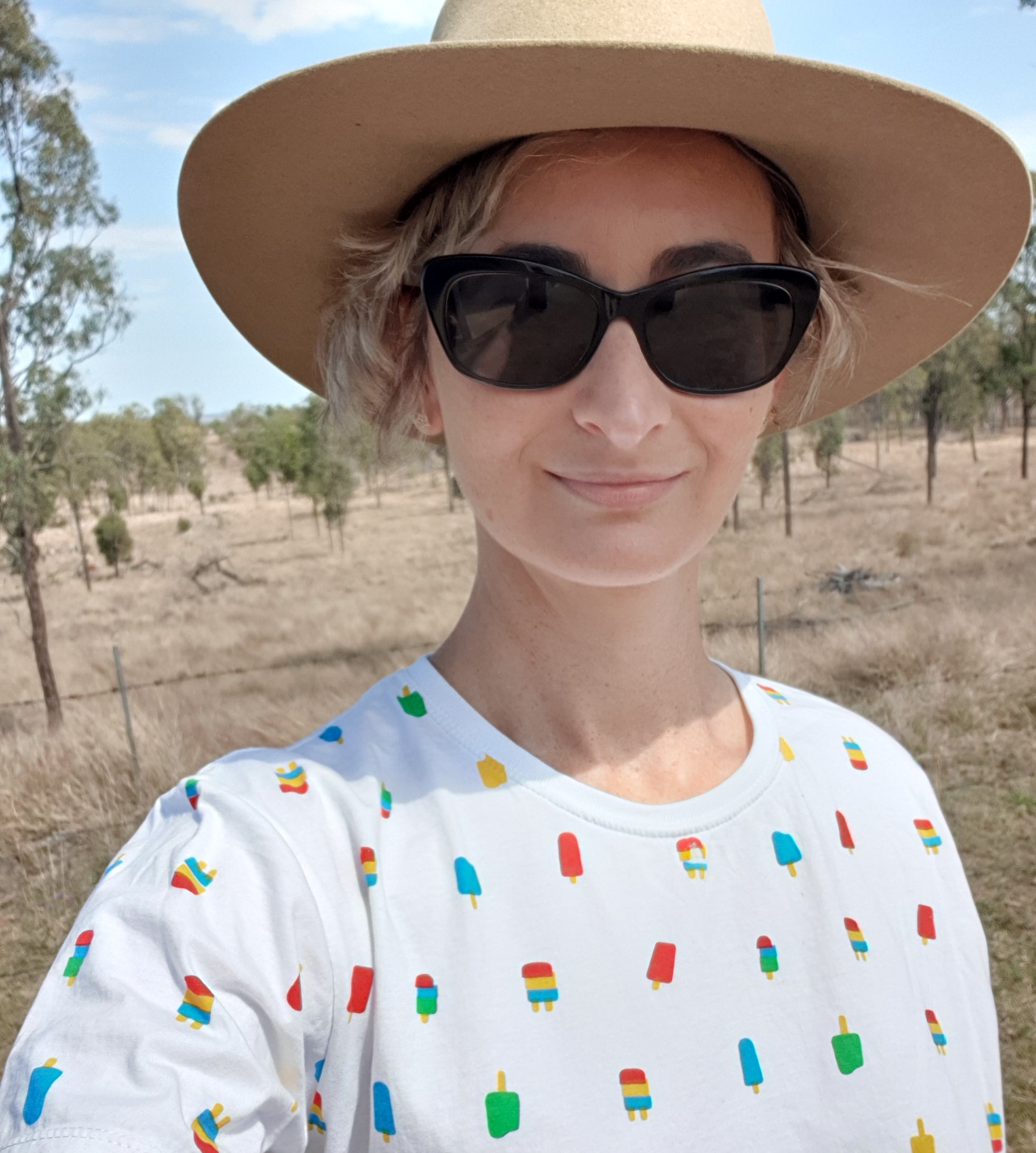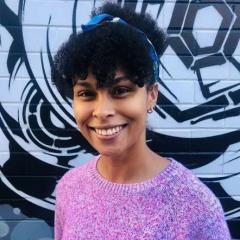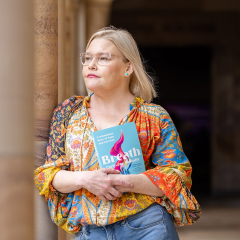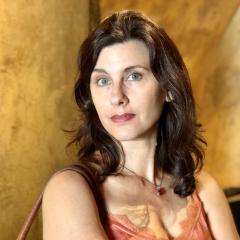As storytellers, writers are always imagining the next scene of a story and how characters react within a setting and plot. Predicating and forecasting is a writer’s main job—answering the question ‘what if’.
So, what if writers begin to write stories that are aimed for practical use? What if they stop writing stories to be read purely for pleasure and write stories that help technologists imagine the challenges of the future?
Science fiction writer and PhD student Jo Anderton has found a path that combines creativity with technology: using her skillset to write scenarios for Trusted Autonomous Systems, Australia’s first Defence Cooperative Research Centre.
Introducing PhD student Jo Anderton 
Jo Anderton is a writer of fantasy, horror, and other types of speculative fiction. She did a Master in Creative writing and is now doing a PhD at the University of Queensland. Jo has won multiple awards for her work. Her publications include the novels Debris, Suited and Guardian, and the short story collection The Bone Chime Song and Other Stories.
Her most recent work The Art of Broken Things was published in early 2022. Inspired by the Japanese practice called Kintsugi—the art of repairing broken pottery pieces together with gold—Jo’s book deals with embracing flaws and the road to healing through the golden cracks.
Applying creative writing
Many writers beginning their degrees expect to find work either in the publishing industry or in the corporate space. However, Jo has found another unexpected route.
A new path opened up for Jo while working on her PhD. Her supervisors Dr. Helen Marshall and Professor Kim Wilkins were running creative foresight workshops that brought together writing skills such as worldbuilding and characterisation for the Defence Science Technology Group.
Working as a consultant writer for Defence was never something that had crossed Jo’s mind before. It seemed like an area that had nothing to do with the creative arts and everything to do with STEMM fields.
“It’s easy to come up with new and interesting technology and go, okay, this is what it does,” says Jo. “But what people actually do with it is something that is really difficult to predict, especially when you're looking at it from a more engineering kind of technology background.”
Jo used her knowledge from that project to begin consulting for Trusted Autonomous Systems. There, her creative writing skills help her write scenarios that imagined the uses of new technologies. The strength she has as a writer, particularly a science fiction writer, is having this perspective that asks ‘what if’.
“The strength we have as writers,” says Jo, “is the way we play with characters, the way we look at consequences, the way we set up logical progressions of cause and effect and then drop unexpected things into them. Similarly, in the Defence field, they want to test a particular technology and see how people and this technology can interact with each other. The way they do that is through story. They give me a set of limitations, timeframes and settings and I take that and turn it into a story— I create characters that interact in these worlds.”
When asked about the challenges involved when doing this work, Jo said, “The different part of this is that they have a list of things they want and need to happen in each story, and they're not plot-related things. Mostly, what they focus on is the ethical problems or particular aspect of this technology that they want addressed. And that's the kind of thing that you don't usually think of when you're writing—you just want to write a good story. You want to write a plot that makes people interested. You want to write characters that people engage with. So I think the most interesting challenge is taking a mental shift in the way I approach stories and ask myself: how do I approach it from this really different angle?”
Jo admits that working in the Defence industry has given her more insight into storytelling and the importance of characters within a setting. Her process of writing begins with worldbuilding and then putting characters inside that world comes later.
“This has taught me the importance of doing the opposite, in that characters are how we as readers can actually get into a story. They are also how, from this kind of practical scenario point of view, we analyse the way technology actually might impact people. Instead of just stating, ‘Oh, this machine can do X’ I look at it as ‘this machine causes this person to lose their job which causes them to do this’. It's a really different way of looking at how technology and worlds works.”
Her PhD topic: Where is the line between fiction and non-fiction?
Jo is currently working on her creative writing PhD, a speculative fiction memoir which focuses on her time spent in Japan, and has clear links to her work for Trusted Autonomous Systems, which involves balancing speculation with challenges in the real world.
She first tried writing a fiction piece and a non-fiction essay inspired by her experience in Japan, but found that it still didn’t express exactly what she wanted people to read. Jo finally decided that in order speak about her experience authentically, she had to combine both the fiction and non-fiction together.
“I realized that in order to write about this time in my life, I needed to do both of those things at once—I needed to write something that was both speculative and real.”
Jo says that her PhD will consist of a collection of speculative fiction short stories and creative non-fiction essays. Her main research topic is the arbitrary line between non-fiction and fiction.
“There's a huge difference in books sales if you look at book scan data based on whether or not something is fiction or non-fiction, whether or not something is real or not real—what people don’t see is that those lines are arbitrary.”
When most people buy a book, that line informs their decision. Some people avoid fiction because they only read ‘real books’. Some people avoid these ‘real books’ and opt for something ‘not real’. But how much of the truth do these ‘real book’ actually show when compared to fiction?
“There are a lot of things,” says Jo, “that we convince ourselves is true. But no one can tell you the true story of their life. And even if they're researching some kind of non-fiction topic, you still select the information that you include, and that selection is based entirely on your own assumptions in your own worldview. So I love kind of looking at that because it's something that I've come up against my entire writing and publishing life.”
Advice for writers
Jo’s advice to writing enthusiasts who still don’t know which path to take in their careers is to be confident in their abilities and skills.
“The skills that we learn and develop in humanities are universal and can be applied across the board. Our ability to look at situations differently, to connect with other people differently, to step into a situation that is fixed into its own little box of the way things are done, and pick it up and shake it is so unique.”
“For me, being able to stand up in a meeting with people high-up in across the Defence force and be able to say what I do has value because of X and Y is terrifying, but also shouldn’t be because we have these skills. I think having confidence in those skills, taking those skills to other disciplines, taking those skills to other places that might not at first, expect them to be useful, is really valuable and something that we should all be willing to do.”
What’s next?
Jo is still pursuing her PhD at UQ while also focusing on the work she has with Trusted Autonomous Systems. The future is still far and unknown, but Jo is excited for whatever may be in store ahead.
Jo also comments about her experience studying at UQ and how grateful she is for the opportunities it has opened for her.
“I am honestly loving it. We are so lucky to have the talent and expertise that we do in UQ. It is just lovely to see not just the professionalism, but also the creativity people are drenched in.”
Written by Zaynab Abdulkadir



